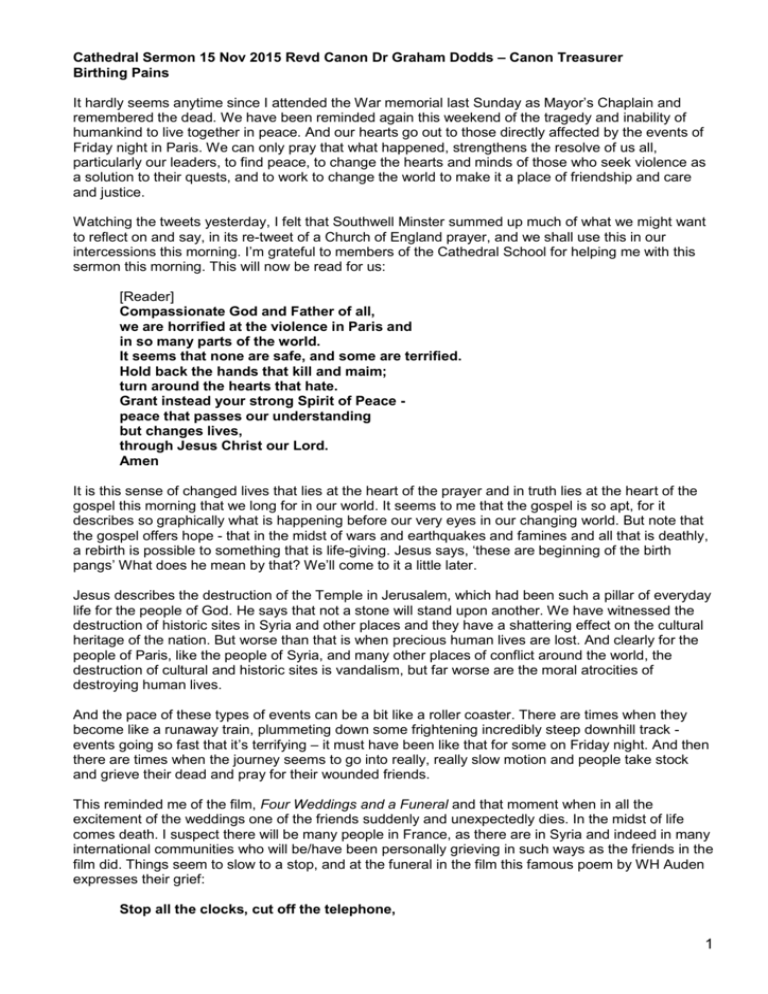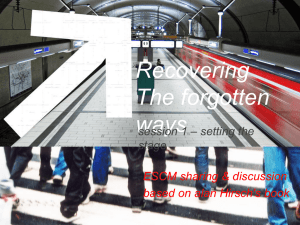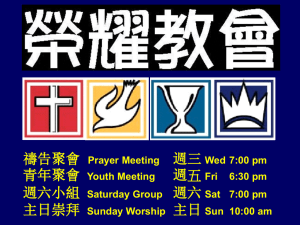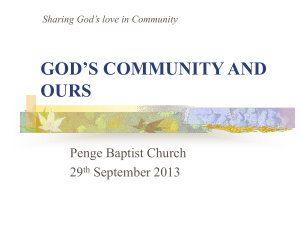Birthing Pains - Wells Cathedral
advertisement

Cathedral Sermon 15 Nov 2015 Revd Canon Dr Graham Dodds – Canon Treasurer Birthing Pains It hardly seems anytime since I attended the War memorial last Sunday as Mayor’s Chaplain and remembered the dead. We have been reminded again this weekend of the tragedy and inability of humankind to live together in peace. And our hearts go out to those directly affected by the events of Friday night in Paris. We can only pray that what happened, strengthens the resolve of us all, particularly our leaders, to find peace, to change the hearts and minds of those who seek violence as a solution to their quests, and to work to change the world to make it a place of friendship and care and justice. Watching the tweets yesterday, I felt that Southwell Minster summed up much of what we might want to reflect on and say, in its re-tweet of a Church of England prayer, and we shall use this in our intercessions this morning. I’m grateful to members of the Cathedral School for helping me with this sermon this morning. This will now be read for us: [Reader] Compassionate God and Father of all, we are horrified at the violence in Paris and in so many parts of the world. It seems that none are safe, and some are terrified. Hold back the hands that kill and maim; turn around the hearts that hate. Grant instead your strong Spirit of Peace peace that passes our understanding but changes lives, through Jesus Christ our Lord. Amen It is this sense of changed lives that lies at the heart of the prayer and in truth lies at the heart of the gospel this morning that we long for in our world. It seems to me that the gospel is so apt, for it describes so graphically what is happening before our very eyes in our changing world. But note that the gospel offers hope - that in the midst of wars and earthquakes and famines and all that is deathly, a rebirth is possible to something that is life-giving. Jesus says, ‘these are beginning of the birth pangs’ What does he mean by that? We’ll come to it a little later. Jesus describes the destruction of the Temple in Jerusalem, which had been such a pillar of everyday life for the people of God. He says that not a stone will stand upon another. We have witnessed the destruction of historic sites in Syria and other places and they have a shattering effect on the cultural heritage of the nation. But worse than that is when precious human lives are lost. And clearly for the people of Paris, like the people of Syria, and many other places of conflict around the world, the destruction of cultural and historic sites is vandalism, but far worse are the moral atrocities of destroying human lives. And the pace of these types of events can be a bit like a roller coaster. There are times when they become like a runaway train, plummeting down some frightening incredibly steep downhill track events going so fast that it’s terrifying – it must have been like that for some on Friday night. And then there are times when the journey seems to go into really, really slow motion and people take stock and grieve their dead and pray for their wounded friends. This reminded me of the film, Four Weddings and a Funeral and that moment when in all the excitement of the weddings one of the friends suddenly and unexpectedly dies. In the midst of life comes death. I suspect there will be many people in France, as there are in Syria and indeed in many international communities who will be/have been personally grieving in such ways as the friends in the film did. Things seem to slow to a stop, and at the funeral in the film this famous poem by WH Auden expresses their grief: Stop all the clocks, cut off the telephone, 1 Prevent the dog from barking with a juicy bone, Silence the pianos and with muffled drum Bring out the coffin, let the mourners come. Let aeroplanes circle moaning overhead Scribbling on the sky the message 'He is Dead'. Put crepe bows round the white necks of the public doves, Let the traffic policemen wear black cotton gloves. He was my North, my South, my East and West, My working week and my Sunday rest, My noon, my midnight, my talk, my song; I thought that love would last forever: I was wrong. The stars are not wanted now; put out every one, Pack up the moon and dismantle the sun, Pour away the ocean and sweep up the wood; For nothing now can ever come to any good. And so the disciples sit across the Kidron Valley in the Mount of Olives and reflect on the Temple - the shiny, gold apparelled, expensively crafted porticos, palisades, walls and magnificent gates and its enormous Holy of Holies. And they ponder on Jesus’ words about no stone being left standing. It must be difficult to imagine the destruction of this shrine of their society, this symbol of their cultural inheritance, this precious cornerstone of their very civilisation. Remember they lived in an intensely religious society, a society that pilgrimaged to this sacred and holy place, and people came daily to offer sacrifice for their sins, and their families, and their daily work. The Temple not only reminded them of their beliefs, but also of the very core of their existence. And yet Jesus ends his teaching with two words of hope, two words - ‘birth pangs’. We need to remember that this story in the gospel is set just a few days before Easter, in the week we now call Holy Week, the week that Jesus died on the cross. The disciples don’t know it at the time but Jesus is about to go through the most intense suffering – through humiliation and hate to torture and death even death on a cross that the Romans reserved for the worst offenders. In a sense he is going to become the Temple that is destroyed – he is going to take the pain, the birthing pains, the birth pangs - for after 3 days he will be raised from the dead and will bring them new life. Through his death and resurrection he brought the world into a new era of life in all its fullness. It’s a life that as Christians, we live and enjoy, but it will only fully come about when he returns – which is referred to as ‘the Day approaching’ at the end of the first reading from Hebrews. In an early part of the first reading the writer says ‘But when Christ had offered for all time a single sacrifice for sins, ‘he sat down at the right hand of God’ and since then has been waiting’. And he says that in between his first coming and his return on the ‘Day approaching’, there will be wars and rumours of wars, earthquakes, famines and false leaders and so on – these are the birth pains of a new life. We live today in 2015 in that in between time, between Jesus coming the first time and his return when the new era will be fully realised. During this time we indeed pray, as we heard at the beginning, pleading that the hands that kill and maim might be held back; that hearts may be turned from hate, that the Spirit of peace that passes our understanding will change lives. And we especially pray for those who are really in the thick of it. And Jesus says the same to us as to the first disciples. It still holds. Regard these things as signs, however painful the signs are, that a new era is coming, a birth is imminent, a new heaven and a new earth will come - a time of peace and justice. It’s as though the world is like a pregnant woman waiting for the arrival of her baby. When she comes to her time, she suffers the pains of birth, but when the baby arrives there will be unspeakable joy. The apostle Paul expounds this further in his letters to the early churches. Listen to these few verses read by Jenna and Gaby, from Romans 8, read from a translation of the Bible called The Message: 2 [Reader] All around us we observe a pregnant creation. The difficult times of pain throughout the world are simply the birth pangs. But it's not only around us; it's within us. The Spirit of God is arousing us within. We are also feeling the birth pangs. These sterile and baron bodies of ours are yearning for full deliverance. That is why waiting does not diminish us, any more than waiting diminishes a pregnant mother. We are enlarged in the waiting. We, of course don’t see what is enlarging us. But the longer we wait, the larger we become, and the more joyful our expectancy. Meanwhile, the moment we get tired in the waiting. God’s Spirit is right alongside helping us along. If we don't know how or what to pray, it doesn't matter. He does our praying in and for us, making prayer out of our wordless sighs, our aching groans. He knows us far better than we know ourselves, knows our pregnant condition, and keeps us present before God. That's why we can be so sure that every detail in our lives of love for God is worked into something good. And so although we wait, indeed the more we wait, the more we grow with God’s life in us and ask ourselves what we can do to make a difference? First, pray – long for, yearn for the peace of the world. There is more power in prayer than any army, movement or weapon. Second, make sure our lives are set to make a difference for good in the world. It’s easy to get bogged down in the day-to-day stuff of life. Jesus says look further on – see what is possible – see beyond the everyday and set your course based on where God is calling you. And practically it might be that it’s important to sit down and think. ‘How might I make a difference to the world through my care of others, through my studies, my relationships, my achievements, my vocation, through our work as a church, through our plans and strategies?’ And remember that as we seek to change the world for good, we will likely encounter, at some level, the pains of new birth, and when we do we shall need to recognise them for what they are. Third, by listening to Christ the peace bringer, and looking to a future in him, we can direct the struggle, that is inevitable in change, not to diminish us or prevent us from achieving God’s purpose, but to enlarge us as individuals, and as the family of the world. As the first reading from Hebrews ended: ‘Let us consider how to provoke one another to love and good deeds, not neglecting to meet together but encouraging one another and all the more as we see the Day approaching.’ And fourth, we can reject the prejudicial stereo-types that make us believe that people of other faiths are wicked and evil. We can challenge these perceptions and think for ourselves and join in solidarity with brothers and sisters of genuine faiths. And so I conclude as we started and ask God to Hold back the hands that kill and maim; turn around the hearts that hate. Grant instead your strong Spirit of Peace - peace that passes our understanding but changes lives, through Jesus Christ our Lord. Amen 3









